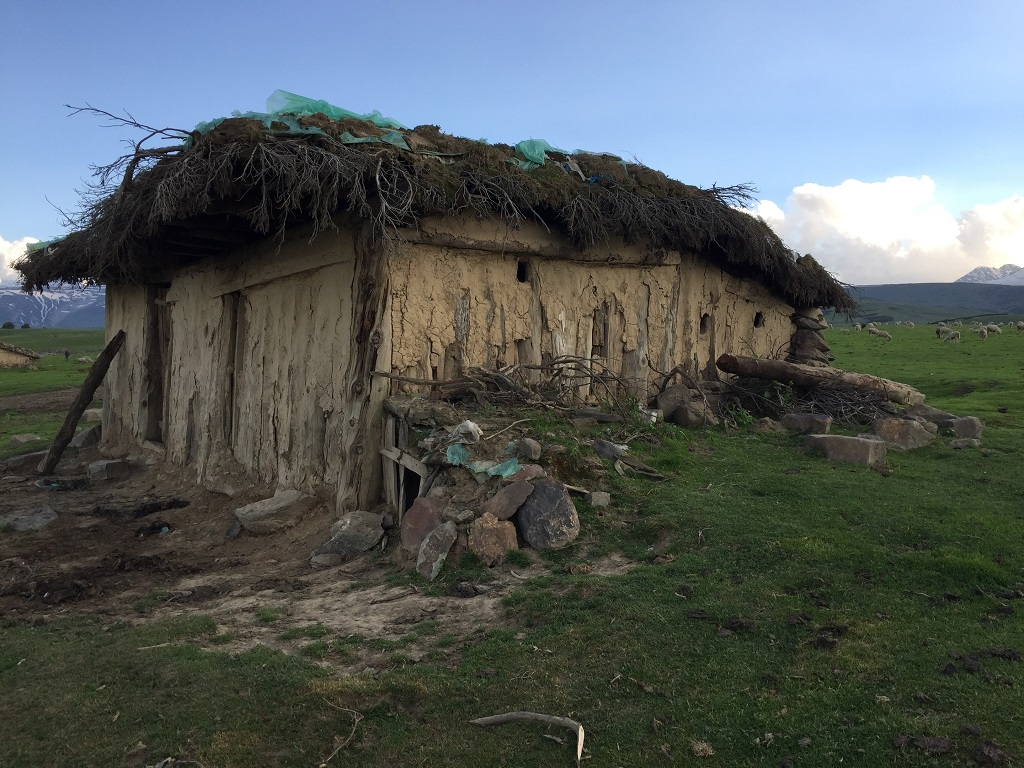Homeless Kashmiri pastoralists denied benefits of forest rights law
[ad_1]
Migrant population unable to repair damaged huts as government sits on claim forms
Pastoralist communities in Kashmir like the Chopans, Gujjars and Bakerwals, whose homes have been damaged by winter snowfall and other reasons in the recent past, are awaiting permission from the forestry department to rebuild them.
I met several affected families from June 19 to 21 of this year. The Gujjars and Chopans lived miserably in the pastures of Pir Panjaal in the district of Budgam. In the absence of their kothas (houses made of logs and mud), the affected nomadic groups sleep in the open in extreme climatic conditions.
After the 2006 Forest Rights Act entered into force last year in the Union, I was sure that the government would issue a circular to the forest service in this regard. But that hasn’t happened yet.
A mud house or kotha of pastors in Kashmir. Photo: author
I visited Dikshal Grassland on June 19, after a three hour hike from Doodhpathri towards Corag base camp in Budgam district. I met shepherdesses and their little children who were collecting wild leafy vegetables in the meadow.
Azee Begum, 70, from Raithan to Budgam, asked my friends and I to take a look at his shelter. The old lady looked depressed and distressed.
I could see from a distance a white tarp spread out on some rocks. Azée said: “Aess che aeth manz rozaan †(we live in there).
Dikshal is located at an altitude of 3,500 meters and witnesses very fast winds almost every day. I couldn’t believe Azee and her family are living under a simple tarp in these harsh weather conditions.
Recently, rapid winds have destroyed hundreds of trees in the nearby forests of Doodhpathri and the Doodh Ganga valley. Diskhal is a green pasture with no forest cover and the winds are faster and stronger in the area.
Chopans tarpaulin shelters are damaged almost every day. The situation is horrible and every night is like a nightmare for these poor shepherds.
Shepherdesses must travel two kilometers (km) downhill each time they need to collect firewood.
We were extremely exhausted and drove to our base camp 1 km downstream from Diskhal in Corag. I assured Azee that I would come see her tarp shelter on the way back.
Coming back from Corag on June 21, I visited Azee’s refuge again. This time I made a short video that went viral on my facebook page.
Kothas burned down
Until half a decade ago, Azee and many other Chopan families owned kothas in the pasture. About ten of these log huts were set on fire in the fall of 2015 in the absence of the families.
It is still unclear who was behind the arson attack.
Nomadic families had upset local timber smugglers by alerting forest officials to their illegal activities. They may have destroyed the kothassources told me.
The Chopans never smuggle timber and work hard for a living. They have been targeted on several occasions for forest conservation.
And yet the forestry department has not even recognized their contribution or allowed them to rebuild their kothas over the past five years.
Embezzlement and delays
Gul Jan, a resident of Gohi Dragan village in Kaich Khansahib and member of the Gujjar community, comes to Mechi Khanain Jabb every summer with a herd of cattle. Mechi Khanain Jabb is also a high altitude pasture located around Diskhal.
Gul Jaan’s husband, who accompanied her to the prairie, died of illness in 2017. But she did not give up on her livelihood.
She continues to come to the pasture with their cattle for three months, with the help of her four children. After August, the cattle are brought back to their village for another three months.
The state of her kotha made of logs, stones and mud is terrible. She asked the forest service to allow her to collect old logs from the nearby forest area of ​​Mechi Khanain Jabb for repair. But the forestry department did not allow it.
Forest officials are even receiving bribes from poor migrant populations for giving such permissions unofficially, sources say.
A few months ago, Gul Jan learned that under the Forest Rights Act (FRA) she could get old logs from the forest to repair her hut. But its reality is quite different.
I met forestry officials in the area who told me that they had no directives from their agents to allow the repair of the kothas.
Rights denied
FRA Article 3 (1) (d) states that community use rights or rights such as grazing rights (both sedentary or transhumant) and access to traditional seasonal resources of nomadic communities or pastoral care are recognized for individuals and communities.
Why does the government not notify a concrete policy on this subject, if these communities have the right to obtain certain rights such as repair or the construction of logs kothas?
The Chopans, Gujjars and Bakerwals are the backbone of our economy as they care for our nearly 4,000,000 sheep and goats and thousands of other varieties of livestock. Is it not the duty of the government, as a welfare state, to ensure that these nomads lead a dignified life, with better shelter in the highland pastures?
The opinions expressed are those of the author and do not necessarily reflect those of Down to earth.
We are a voice for you; you have been a great support to us. Together, we are building independent, credible and courageous journalism. You can help us more by making a donation. It will mean a lot to our ability to bring you news, insights and analysis from the field so that we can make changes together.
[ad_2]

